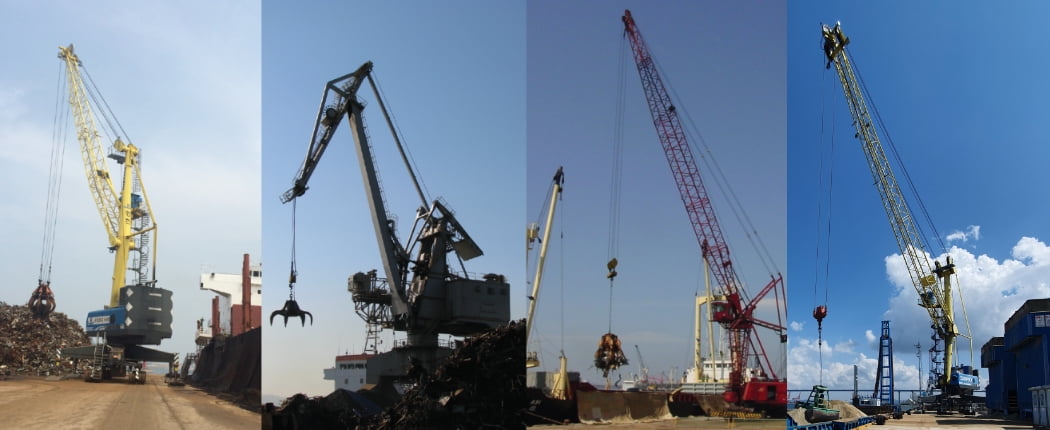Environmental resources
Creating the foundation for sustainable building materials
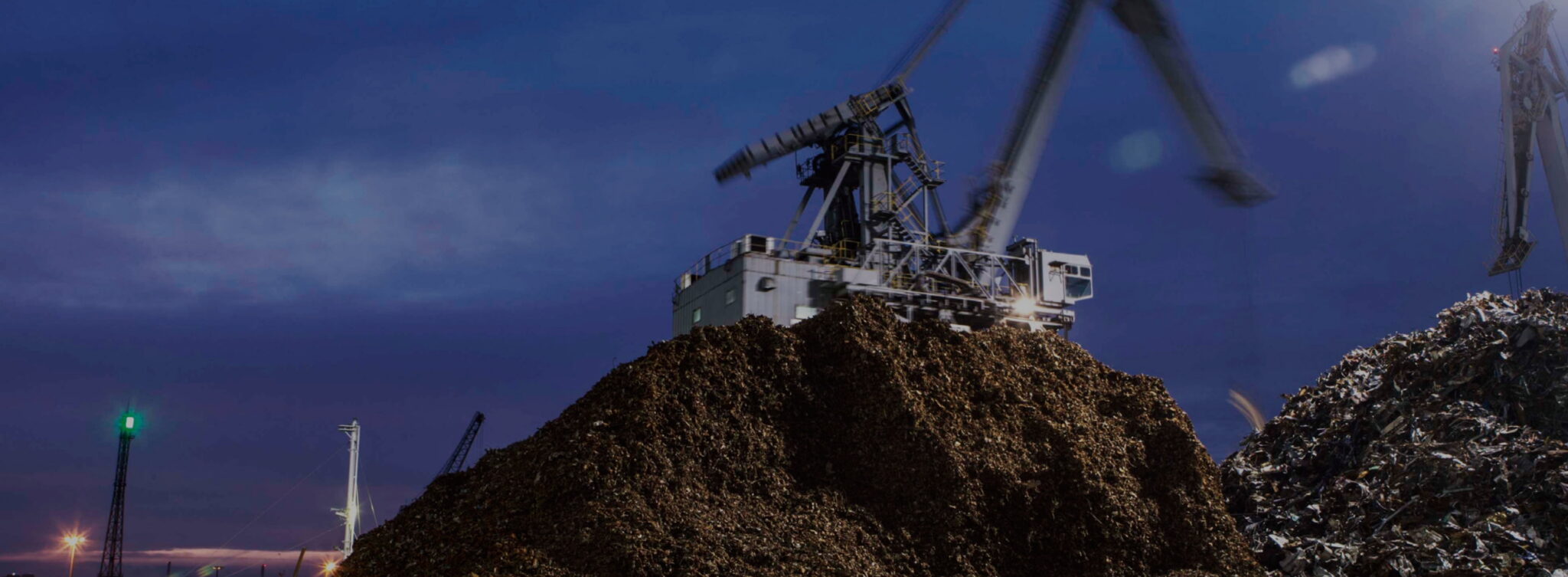
Extending the environmental resource business to resolve resource deficiency and conserve the environment
Starting with the scrap business of resupplying recyclable steel scraps and end-of-life vehicles (ELVs) as a raw material for a steel company after processing and refining them, the environmental resource businesses of creating the sustainable future are divided into the steel byproduct business of recycling the steel byproducts and the incineration and drying business of treating combustible waste in an eco-friendly way and turning them into energy. We promise to make a sustainable future by accelerating the transition to a resource circulation society.
Scrap business
We contribute to the development of the steel industry by stably supplying scraps to the steel maker, an important raw material in the steel industry, while collecting, processing, and selling them. We are also advanced in environment conservation through resource circulation.
We supply over 700,000 tons of scraps per year to a steel company by building a large-scale turnkey production system with an automatic process. We disassemble ELVs into steel and nonferrous metal with the largest shredder plant in Korea. We use 3 guillotine shears and 1 compressor to recycle of old waste scrap.
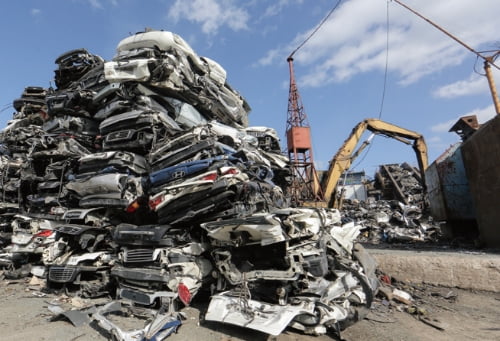
Shredder Plant
Shredder plant / Facility of selecting out nonferrous metal generated in the shredding process after producing shredder products by shredding ELVs and waste electronic equipment
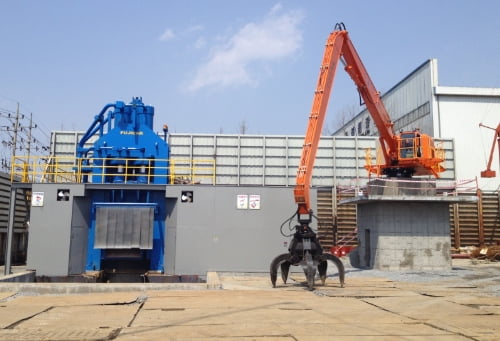
Guillotine Shear
Facility of compressing and cutting lengthy heavy and light weight scraps into the size of 1 ㎡. It increases the work efficiency of an electric furnace by increasing a charging property when injecting the cut scraps to a furnace of a steel company
Economic value and sustainability
Steel scrap is an important raw material for the steel industry and accounts for more than 95% of the input source of the electric furnace, and since it accounts for more than 50% of the manufacturing cost of raw materials for steel, a stable supply is very important.
In addition, Steel scrap can reduce carbon dioxide emissions from the steel production process by 75% compared to iron ore (main ingredient for blast furnace), which makes it an effective circular resource for reducing greenhouse gas emissions.

Steel by-product business
It is a business of crushing, selecting, and processing the byproducts pig metal, mill scale, slag, sludge, dust, etc.) generated during the process of a steel company and mill and recycling them as a raw material of the steel and cement industry and a basic material for construction work.
Slag is a steel by-product composed of the same components of natural rock. Slag has a hydraulic property where it is hardened when contacting moisture for a long time, so it is useful for foundation works for road and building, filling materials for public waters, and fillers for a caisson. The steel slag aggregate can reduce resource damage as it can economically replace natural aggregate materials.

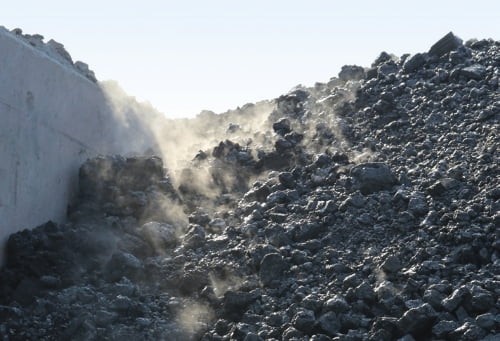
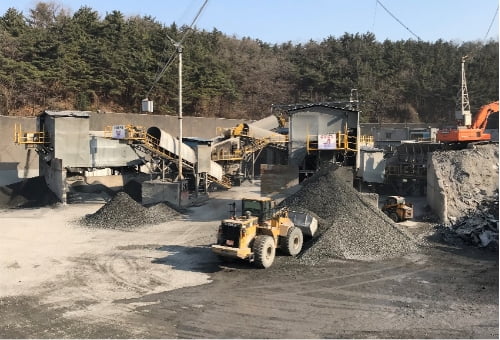
We collect, select, and process scrap dusts generated from a steel company and scrap treatment company to supply such valuable materials to a steel and non-ferrous making company as a raw material. We contribute to increasing the production efficiency and cost reduction by supplying high quality products to a steel and cement company with the top byproduct refining technology in Korea while taking a lead in improving the import-substituting effect and preserving the environment by recycling resources.
Incineration business
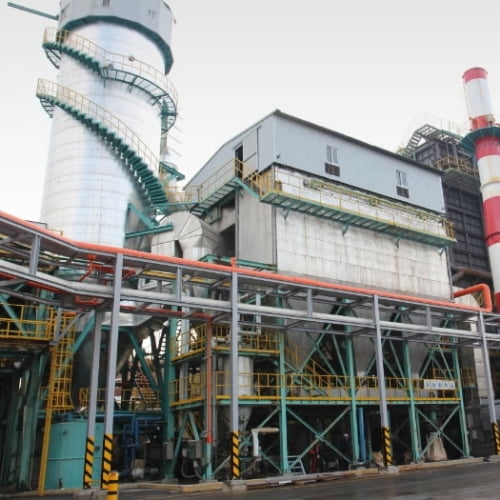
The wastes generated from daily life and industrial activity are buried in the land or incinerated. It takes 20 years for a disposable cup to be decomposed, 100 years for plastic bottles and disposable diapers, and over 500 years for Styrofoam. Incineration is also used as an alternative for such wastes as they cause soil and water pollution.
We introduced state-of-the-art facilities to incinerate domestic and industrial wastes in a safer manner and to prevent environmental pollution by thoroughly conducting follow-up measures.
In addition, we operate a TMS (Tele Monitoring System) that monitors pollutants generated during the incineration process in real-time and automatically transmits them to the Yeongnam Control Center of the Korea Environment Corporation (K-eco) to thoroughly control the generation of pollutants.
Drying business
With the use of the incineration heat, we minimize the volume of wastes by drying various sludges. By doing so, we save waste treatment cost while contributing to environmental conservation.
The marine deposits polluted with domestic sewage industrial wastewater worsen the water pollution and destroy the marine ecosystem. We prevent marine pollution by drying organic wastes with incineration heat obtained by incinerating combustible waste. We also lead the way in environmental preservation by responding to the government’s energy policy including the securing of carbon credits by turning dried byproducts into energy.

Harbor cargo handling business
As a forerunner in logistics supporting the import and export industry, we are a leader in enlarging and mechanizing the harbor cargo handling equipment. With cutting-edge equipment and accumulation of professional technology, we are in an unequaled position as a professional harbor cargo handling company.
The Cargo Business Division is responsible for processing cargo imported and exported via Pohang Steel Industrial Complex with the annual cargo handling capacity of two million tons by operating two berths worth 30,000 tons and one berth worth 10,000 tons at Pohang New Port Wharf #8. We also demonstrate an annual capacity of 1.3 million tons by operating shipments one berth worth 30,000 tons at the Port of Pyeongtaek-Dangjin.
Major Handling Cargo
Scrap, STS scrap, pig iron, subsidiary raw materials (Sli-Mn, Fe-Si, etc.), semi-finished products (billet, etc.), steel products (H beam, sheet pile, steel reinforcement, angle, rail, etc.)
